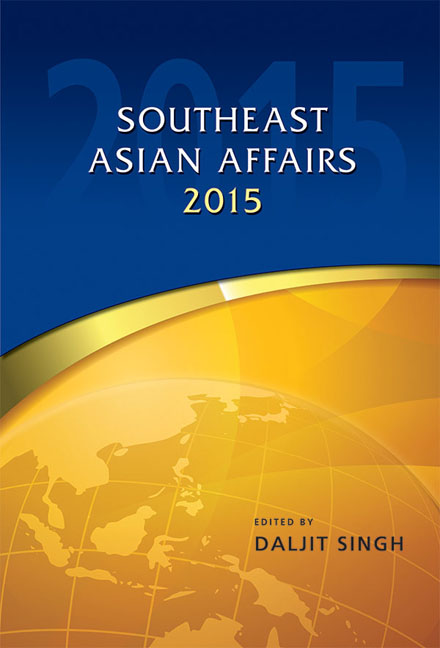Book contents
- Frontmatter
- Contents
- Foreword
- Introduction
- Acknowledgements
- THE REGION
- BRUNEI DARUSSALAM
- CAMBODIA
- INDONESIA
- LAOS
- MALAYSIA
- MYANMAR
- THE PHILIPPINES
- SINGAPORE
- Singapore in 2014: Managing Domestic and Regional Concerns and Signalling a New Regional Role
- Managing Cyberspace: State Regulation versus Self-Regulation
- THAILAND
- TIMOR-LESTE
- VIETNAM
Managing Cyberspace: State Regulation versus Self-Regulation
from SINGAPORE
Published online by Cambridge University Press: 19 May 2017
- Frontmatter
- Contents
- Foreword
- Introduction
- Acknowledgements
- THE REGION
- BRUNEI DARUSSALAM
- CAMBODIA
- INDONESIA
- LAOS
- MALAYSIA
- MYANMAR
- THE PHILIPPINES
- SINGAPORE
- Singapore in 2014: Managing Domestic and Regional Concerns and Signalling a New Regional Role
- Managing Cyberspace: State Regulation versus Self-Regulation
- THAILAND
- TIMOR-LESTE
- VIETNAM
Summary
Introduction
The traditional media in Singapore has played a supportive role in nation building since post-independence, with the print and broadcast media deployed for the purpose of communicating state policies to the populace. The government's control of the media was justified on the grounds of building social cohesion among its citizens from diverse ethnic, racial and religious backgrounds. A myriad of laws was put in place to govern both print and broadcast media such as the Broadcasting Act, the Newspaper and Printing Presses Act, Undesirable Publications Act and Public Entertainment and Meetings Act. The public service monopoly of broadcasting was intended to protect and promote national culture and identity and the prohibition of private ownership of the mass media as well as satellite dishes (until the 1990s) helped the government to maintain both political and social stability, critical factors that are purported to have created Singapore's economic success.
Within a short span of about forty years since its independence, Singapore's growth achieved a phenomenal rate, averaging 8 per cent per annum, an outcome that has been attributed to the government's sound economic planning and focused efforts to attract foreign investments in various industrial sectors. The 1990s witnessed a shift in the policymakers’ priority as they embarked on transforming the island with a population of over four million into an information hub, one that trades in ideas rather than commodities. Visible success for initiatives such as the Singapore IT2000 Masterplan and Infocomm 21 Strategy was clearly evident from the sharp increase of Internet penetration and broadband among the populace. By 2009, Internet access and broadband access among households reached 81 per cent and 80 per cent respectively. In that same year, Singapore was ranked among the top five economies in Asia Pacific on the ICT Development Index.
This chapter examines the development of the online space in Singapore, specifically the broadening of public discourse and civic engagement among citizens in recent years. While the online space has provided opportunities for marginalized voices and players to emerge, its dark side has reared up in the form of anti-social behaviour such as anti-foreigners and racist speech, trolling and witch-hunting. The latter has given rise to concerns among policymakers and the public on the polarizing effects of new media on society.
- Type
- Chapter
- Information
- Southeast Asian Affairs 2015 , pp. 321 - 334Publisher: ISEAS–Yusof Ishak InstitutePrint publication year: 2015



